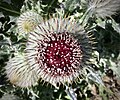Description
Cirsium occidentale is a biennial plant or perennial plant forming a taproot. It may be short or quite tall, forming low clumps or towering to heights approaching 3 meters (10 feet). The leaves are dull gray-green to bright white due to a coating of hairs, and the most basal ones on large plants may be nearly 0.5 m (1+1⁄2 ft) in length. [4] [3] The petioles are winged and spiny and the leaves are toothed or edged with triangular lobes. [5]
The inflorescence at the top of the whitish stem holds one to several flower heads. Each head is sphere-like, covered in large phyllaries with very long, spreading spines which are laced, often quite heavily, in fibers resembling cobwebs. [5]
The head is packed with disc florets which may be white to blood red to shades of purple. The largest flower heads exceed 8 centimeters (3 inches) in diameter. [4] The heads do not open in synchrony, perhaps allowing greater likelihood of being pollinated. [5]
This page is based on this
Wikipedia article Text is available under the
CC BY-SA 4.0 license; additional terms may apply.
Images, videos and audio are available under their respective licenses.







